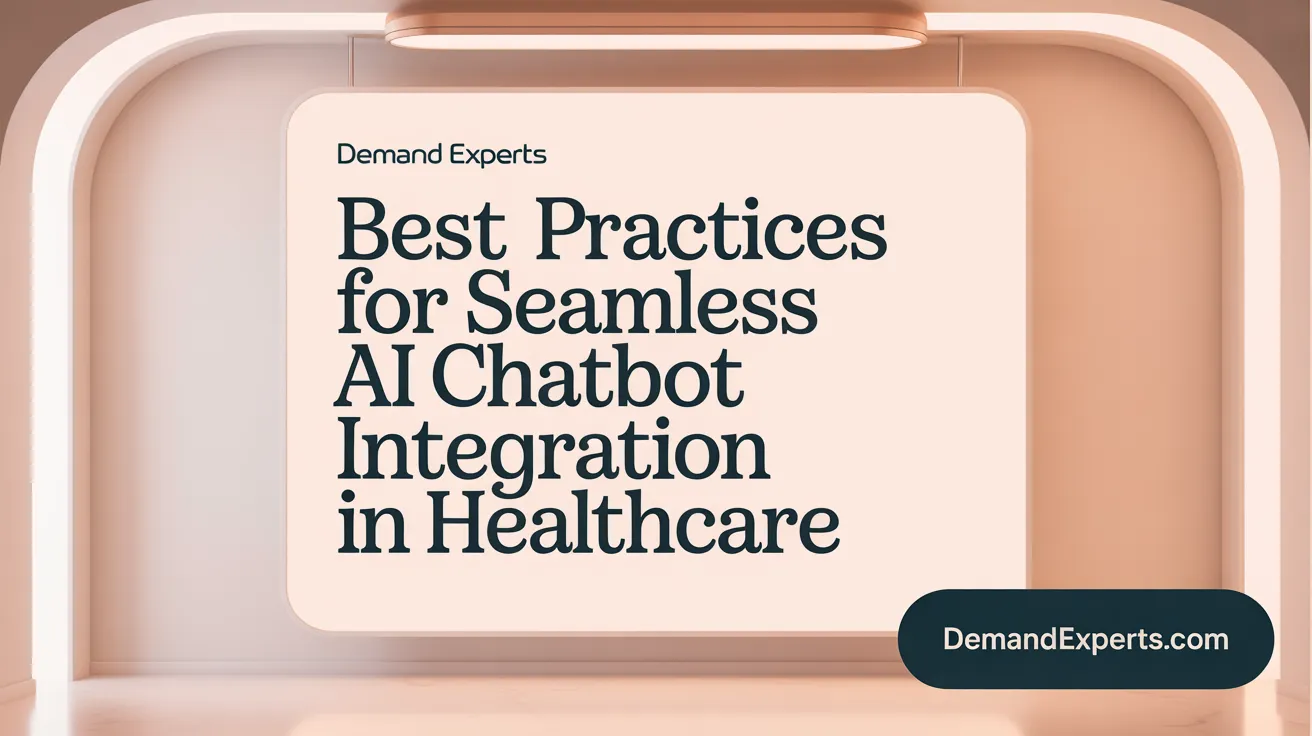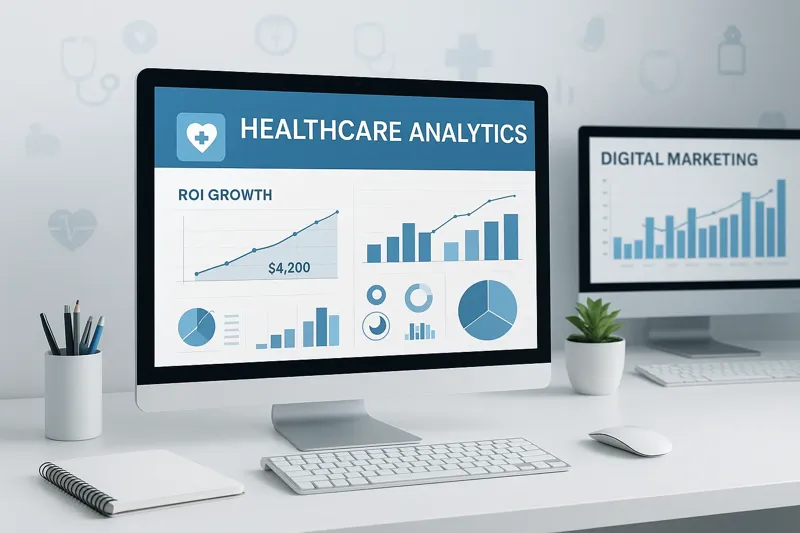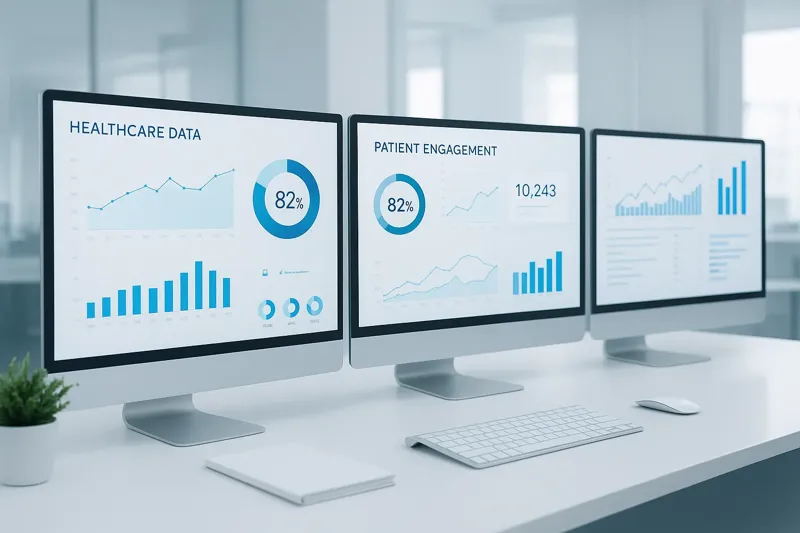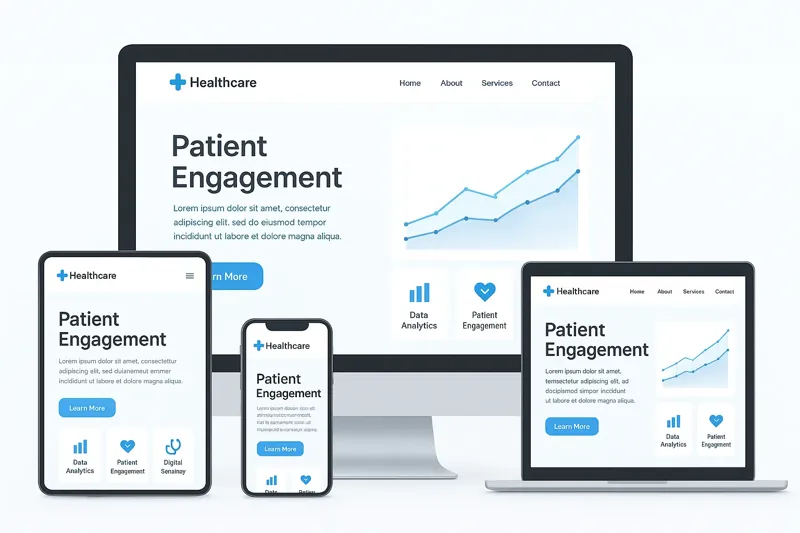Transforming Healthcare Communication with AI Live Chat Solutions
As the healthcare industry faces increasing demands for efficient and accessible patient communication, AI live chat solutions have emerged as transformative tools. These technologies streamline patient inquiries, enhance engagement, and optimize operational workflows, enabling healthcare providers to deliver superior care and support. This article explores how AI chatbots and live chat systems are reshaping patient interaction, the technological innovations driving their success, practical applications in clinical settings, and the challenges to consider for effective implementation.
Streamlining Patient Inquiries with AI Live Chat Solutions
How can AI live chat solutions streamline patient inquiries in healthcare?
AI live chat solutions are transforming healthcare communications by automating and optimizing how patient inquiries are handled. These systems can perform initial triage by quickly assessing symptoms and directing patients to the appropriate care pathways, which reduces wait times and eases the load on medical staff (AI chatbots in healthcare, Conversational AI in healthcare).
Through instant, round-the-clock responses, AI chatbots manage routine questions about appointments, medication details, billing, and health information. When these chatbots are combined in hybrid models—merging AI with human support—they ensure that complex or sensitive issues are escalated to trained healthcare professionals, maintaining quality and empathy (Hybrid chatbots with NLP and machine learning, Live Chat vs AI Chatbots).
Integration with electronic health records (EHRs) and telehealth platforms enhances the system's ability to deliver personalized and connected care. For example, AI chatbots can access patient data for tailored advice, set up virtual visits, and even monitor health parameters through IoT devices, supporting ongoing remote health management (Integration of chatbots with EHR systems, Telemedicine platform chatbots).
This technological approach significantly reduces administrative burdens like appointment scheduling, follow-ups, and paperwork, which traditionally consume significant staff time. Consequently, hospitals and clinics experience fewer cancellations, better patient adherence to treatment plans, and improved overall satisfaction (Reducing administrative burden in healthcare, AI chatbots appointment scheduling).
Ultimately, AI chat live solutions promote more efficient healthcare delivery by providing accessible, quick, and reliable support. They foster stronger patient-provider relationships through continuous engagement and personalized care, ultimately improving clinical outcomes and operational workflows in healthcare settings (AI chatbots enhancing patient engagement, AI in patient-clinician communication).
Benefits of AI Chatbots and Live Chat Systems in Patient Support
AI chatbots and live chat systems play a pivotal role in transforming patient support by providing continuous, personalized interactions that significantly improve patient engagement with AI chatbots and care delivery.
One of the most immediate advantages is their 24/7 healthcare chatbot support, allowing patients to access assistance anytime, whether it's appointment scheduling with chatbots, symptom checking AI chatbots, or receiving medication reminders via chatbots. This instant response capability reduces wait times and administrative burdens for healthcare staff, leading to enhanced operational efficiency.
Hybrid models that combine AI with human oversight enhance the accuracy of diagnostics and support, especially in mental health and chronic disease management. For example, AI-driven mental health chatbots like Woebot offer stigma-free support, while remote monitoring tools track chronic conditions, assisting in early intervention and reducing hospital readmissions.
Effective integration with healthcare IT systems such as electronic health records (EHRs), Internet of Things (IoT) devices, and telehealth platforms enables seamless care coordination. This integration supports real-time alerts, remote patient monitoring, and efficient data collection, leading to better health outcomes and personalized care plans.
Additionally, these systems foster improved health literacy and adherence by providing tailored educational content and behavioral support. Patients are more likely to follow treatment regimens and attend appointments when engaged through accessible and friendly digital interfaces.
However, challenges related to data privacy and security, ensuring compliance with laws like HIPAA, maintaining ethical standards, and building patient trust are essential for widespread adoption. Advances in encryption, transparency, and culturally sensitive AI aim to address these concerns.
Overall, by enhancing accessibility, operational efficiency, and personalized care, AI chatbots and live chat tools are reshaping healthcare support systems, making them more responsive, efficient, and patient-centered.
Practical Applications of AI Chatbots in Healthcare Settings

AI chatbots are increasingly becoming integral parts of healthcare delivery, supporting various clinical and administrative functions. One of the most common applications is appointment scheduling automation, where chatbots facilitate patient self-booking, rescheduling, and reminder alerts. This reduces wait times and frees staff to focus on more complex care tasks.
Symptom assessment and triage constitute another critical use. Chatbots like Ada or Sensely ask patients about their symptoms through conversational interfaces, helping to stratify urgency and directing them to appropriate care settings. They enable round-the-clock symptom monitoring, improving early intervention and patient safety.
Medication management and reminders are widely implemented, ensuring patients adhere to prescribed regimens. Chatbots send timely alerts for doses, monitor adherence, and answer medication-related questions, supporting chronic disease management and decreasing hospital readmissions.
For mental health and chronic disease support, AI chatbots such as Woebot and Youper offer empathetic, stigma-free initial guidance. They assist individuals in managing conditions like depression, anxiety, diabetes, and hypertension by providing behavioral coaching, emotional support, and educational resources.
Virtual consultations and health education represent another key application. Chatbots can analyze patient-reported data, facilitate virtual visits, and provide tailored health information. They serve as digital health educators, explaining medical procedures, lifestyle modifications, and preventive strategies, which enhances patient engagement and understanding.
Additionally, chatbots streamline administrative tasks including billing inquiries and patient intake. They verify insurance details, process forms, and gather necessary information before appointments, significantly reducing paperwork and optimizing clinic workflows (see more).
Overall, AI chatbots improve operational efficiency, enhance patient access to care, and support personalized health management. Nonetheless, their deployment must be complemented by human oversight to handle complex cases, ensure data privacy, and maintain medical accuracy, addressing challenges like ethical concerns and technology limitations.
Core Technologies and Features Underpinning Healthcare AI Chat Solutions

In the rapidly evolving landscape of healthcare, AI chatbots in healthcare are built on a foundation of sophisticated technologies designed to deliver accurate, secure, and accessible patient support. Central to these solutions is advanced natural language processing (NLP) which enables chatbots to interpret and respond to human language in a natural, empathetic manner. NLP components include natural language understanding (NLU) and natural language generation (NLG), allowing for meaningful interactions that can comprehend complex medical terminology, intent, and context.
Complementing NLP are speech recognition systems that convert spoken language into text, facilitating voice-based interactions, which are increasingly important in multi-modal communication setups. Sentiment analysis further enhances chatbot responsiveness by gauging patient emotions, enabling more personalized and emotionally intelligent responses.
An essential aspect is the seamless integration with electronic health records (EHRs), telemedicine platforms, appointment management tools, and wearable devices. Such integration ensures real-time data exchange, accurate symptom assessment, and coordinated care, empowering both clinicians and patients.
Underlying these capabilities are machine learning and deep learning algorithms that allow continuous system improvement. These models analyze vast datasets to enhance response accuracy, predict health risks, and tailor recommendations to individual patient profiles.
Security and privacy safeguards are integral to building trust, especially given the sensitive nature of health data. Implementation of encryption protocols, access controls, audit trails, and compliance with regulations like HIPAA and GDPR ensures data protection and fosters user confidence.
To maximize accessibility, healthcare AI chatbots often incorporate multimodal and multilingual features, supporting text, voice, images, and videos across multiple languages. This inclusivity broadens healthcare access for diverse populations, including those in remote or underserved areas.
Overall, these technological components and features work synergistically to create comprehensive, reliable, and user-friendly AI chatbot systems transforming healthcare delivery by improving efficiency, patient engagement, and clinical outcomes.
More info search query: Technologies used in healthcare AI chatbots
Implementing AI Chatbots in Healthcare: Best Practices and Considerations

When introducing AI chatbots in healthcare environments, following best practices ensures they serve patients and providers effectively while safeguarding sensitive information. Foremost, prioritizing patient data privacy and security is critical; this involves strict adherence to regulations like HIPAA, applying data anonymization, encryption, and access controls to prevent breaches (HIPAA compliance in AI solutions, Healthcare AI security and compliance).
Seamless integration with existing healthcare systems, such as Electronic Health Records (EHRs), appointment scheduling software, and telemedicine platforms, enhances operational efficiency. It allows chatbots to retrieve and update information accurately, supporting workflows without creating data silos (integration of chatbots with EHR systems).
Designing user-centric interfaces that facilitate natural, empathetic conversations through advanced natural language processing (NLP), generative AI technologies, and machine learning fosters trust and engagement. Supporting multilingual capabilities and intuitive interactions makes the technology accessible to diverse patient groups (multilingual healthcare chatbots, conversational AI in healthcare).
Regular updates and continuous monitoring of chatbot responses are essential to maintain accuracy and relevance. This involves validating information, refining AI models with new data, and incorporating feedback from users and healthcare professionals (continuous monitoring and AI model refinement).
Establishing clear escalation pathways for complex or uncertain cases ensures patient safety. When a chatbot encounters difficult inquiries, directing users promptly to qualified clinicians or human support minimizes risks (healthcare chatbot escalation and human oversight, live chat vs AI chatbots).
Finally, addressing biases and ethical concerns—such as misinformation, equitable access, and transparency—is vital to maximize benefits while mitigating potential harms. Ongoing evaluation, ethical guidelines, and stakeholder engagement help build trustworthy, responsible AI healthcare solutions (ethical issues in healthcare chatbots, Responsible AI development in healthcare).
Enhancing Patient Communication and Operational Efficiency with AI Chatbots
AI chatbots are revolutionizing patient communication and operational workflows within healthcare settings. By leveraging natural language processing (NLP), machine learning, and advanced deep learning models, these digital tools offer consistent, rapid, and highly personalized responses to patient inquiries around the clock. This means patients experience faster support for common questions about symptoms, appointments, medication adherence, and health information, which significantly elevates patient engagement and satisfaction.
Automation is at the core of their impact. Routine clinical and administrative tasks—such as scheduling appointments, triaging symptoms, issuing medication reminders, and collecting health data—are efficiently managed by AI chatbots. This automation reduces wait times for patients, minimizes errors, and decreases paperwork, leading to lower operational costs and freeing healthcare professionals from repetitive tasks. Many chatbots are integrated with electronic health records (EHR) and telehealth platforms, enabling personalized, data-driven care plans tailored to individual health histories and real-time observations.
Moreover, AI chatbots support remote patient monitoring and virtual consultations, especially vital during scenarios demanding social distancing or for patients in underserved areas. Through continuous health tracking and instant communication, they assist in early detection of health issues and facilitate timely interventions, improving overall clinical outcomes.
The use of intelligent AI tools also alleviates healthcare provider workload and burnout. By handling high-volume interactions efficiently, chatbots allow clinicians to focus on complex cases requiring human judgment. They are capable of identifying emotional states or potential mental health concerns through sentiment analysis, further supporting holistic patient care.
While the benefits are substantial, challenges remain. Ensuring data security and patient privacy, building trust, and managing ethical considerations are essential for widespread adoption. Nonetheless, overall, AI chatbots are a transformative asset that enhances healthcare communication, streamlines workflows, and promotes better health management, driving the future of more accessible, efficient, and personalized care.
Trends, Market Outlook, and Future Directions of AI Chat Technologies in Healthcare

The landscape of AI chatbots in healthcare is marked by robust growth and continual innovation. Currently, there is widespread adoption of virtual assistants and chatbot solutions that support symptom checking, appointment management, medication adherence, and mental health services. These tools leverage advancements in natural language processing (NLP), machine learning, and multimodal AI to facilitate more natural, contextually aware, and emotion-sensitive interactions.
Market projections indicate that the healthcare AI chatbot industry will expand significantly, reaching over USD 10 billion by 2034. North America remains the dominant region, driven by substantial investments, mature healthcare infrastructure, and high technology adoption rates. Meanwhile, the Asia-Pacific region is emerging as the fastest-growing market, fueled by increasing healthcare digitization and rising demands for accessible medical services.
Future directions emphasize integrating AI chatbots more deeply with clinical workflows. This includes enhancing diagnostic support through real-time data analysis, predictive analytics for early intervention, and personalized treatment planning. The goal is to improve diagnostic accuracy and optimize care coordination by seamlessly linking chatbots with electronic health records (EHRs), telemedicine platforms, and remote monitoring devices.
Innovation in emotional intelligence features is also on the rise. Developing chatbots that recognize and respond to patient emotions can improve engagement and trust, especially in mental health care. Multilingual capabilities are expanding, enabling chatbots to serve diverse populations across different regions, overcoming language barriers and increasing healthcare accessibility.
Regulatory and privacy considerations play a crucial role in shaping future development. Compliance with data protection laws such as HIPAA in the US and GDPR in Europe ensures patient confidentiality and trust. These regulations are prompting the evolution of more secure, transparent AI systems with explainability features for clinical decisions.
Despite these advances, challenges such as biases in AI models, integration complexities, and ensuring human oversight remain. However, these challenges also present opportunities for AI developers and healthcare providers to collaborate on standards, ethical frameworks, and innovative solutions.
In summary, AI chat technologies in healthcare are poised to become central to future healthcare delivery, supporting everything from remote patient monitoring to complex diagnostics. Continued technological improvements, regulatory clarity, and increased acceptance will enable these tools to enhance patient outcomes, operational efficiency, and the overall quality of healthcare services worldwide.
Challenges, Limitations, and Safety Considerations in Healthcare AI Chatbot Deployment

Deploying AI chat solutions in healthcare involves navigating a complex landscape of challenges of AI chatbots in healthcare, limitations, and safety issues that must be carefully managed to protect patients and ensure effective care.
One of the primary concerns is data privacy and security. Healthcare AI chatbots handle sensitive personal health information, making them prime targets for cyber threats. Ensuring compliance with regulations such as HIPAA or GDPR is essential. Implementing measures like end-to-end encryption, anonymized data processing, strict access controls, and comprehensive audit logs helps safeguard patient data from breaches and unauthorized access.
Bias and misinformation are other critical risks. AI models trained on biased datasets or lacking diverse data can produce inaccurate, misleading, or even harmful responses. Such biases could exacerbate healthcare disparities or lead to incorrect clinical advice. Continuous evaluation, diverse training data, and transparent, explainable algorithms are necessary to minimize these risks (Ethical issues in healthcare AI).
Technical integration remains a significant challenge. AI chatbots must seamlessly connect with existing healthcare systems like Electronic Health Records (EHRs) and clinical workflows. Compatibility issues, system complexity, and technical failures can hinder deployment and impact reliability, requiring robust testing, ongoing maintenance, and user-friendly interfaces (Integration of chatbots with EHR systems).
Safety considerations underscore the need for human oversight. While AI can assist with routine inquiries, complex or high-risk situations—such as mental health crises or emergency cases—must be escalated to qualified healthcare professionals. Clear protocols for escalation and continuous monitoring are vital to prevent errors or neglect.
Ethical and medicolegal concerns also come into play. Issues around informed consent, transparency about AI use, accountability for errors, and the potential for hallucinated content—AI generating plausible but false information—must be addressed. Developing clear guidelines, disclaimers, and accountability frameworks is crucial for responsible implementation (Ethical and Privacy Challenges in AI).
Finally, building patient trust and addressing disparities in access are ongoing challenges. Some populations may lack digital literacy or internet access, risking further health inequalities. Ensuring culturally sensitive, multilingual, and empathetic interactions, along with education about AI limitations, helps foster trust and promotes equitable access (Personalized Care through Chatbots, Multilingual healthcare chatbots).
In summary, addressing these multifaceted challenges through rigorous security protocols, ethical standards, effective human oversight, and system integration strategies is essential to harness the full potential of AI chatbots in healthcare while maintaining safety and trust.
The Role of AI in Enhancing Healthcare Communication, Diagnostics, and Patient Engagement Workflows
AI significantly transforms healthcare workflows by enabling more natural and interactive patient dialogues. Through sophisticated virtual assistants and chatbots, AI facilitates personalized health conversations, providing patients with tailored reminders, appointment scheduling, symptom assessment, and educational resources. These tools are capable of understanding complex medical queries thanks to advanced natural language processing, allowing for smoother, more human-like interactions.
In diagnostics, AI leverages vast, multi-modal datasets—including medical imaging, genomics, and electronic health records—to identify disease patterns quickly and with high accuracy. For example, AI algorithms nowadays outperform traditional methods in areas such as cancer screening, radiology, and early detection of chronic conditions, enabling faster diagnosis and timely interventions (AI transforming diagnostics).
Moreover, AI enhances patient engagement by supporting remote health monitoring and delivering personalized interventions that improve adherence to treatments and lifestyle modifications. Mental health applications powered by AI offer accessible, stigma-free support, tracking emotional states and providing coping strategies (mental health support chatbots).
AI also streamlines clinical workflows by automating routine administrative tasks, such as documentation and billing, freeing up clinicians’ time for more direct patient care (automate clinical workflows). AI-driven decision support systems assist in selecting optimal treatment plans, predicting patient outcomes, and managing resources effectively (clinical decision support with chatbots).
Together, these capabilities make healthcare delivery more efficient, precise, and centered on individual patient needs, ultimately leading to better health outcomes and a more responsive healthcare system.
Harnessing AI Live Chat for Future-Ready Healthcare
AI live chat solutions represent a pivotal advancement in healthcare communication, offering scalable, efficient, and personalized patient support while alleviating pressure on healthcare providers. Through sophisticated technologies like natural language processing and machine learning, AI chatbots streamline patient inquiries, automate routine tasks, and integrate seamlessly with clinical workflows and health information systems. As the market grows and technologies mature, addressing challenges around data privacy, ethical use, and human oversight will be crucial. Embracing these innovations promises improved health outcomes, operational efficiencies, and enhanced patient engagement, ultimately transforming healthcare delivery to be more accessible, responsive, and patient-centric.
Transforming Healthcare Communication with AI Live Chat Solutions
As the healthcare industry faces increasing demands for efficient and accessible patient communication, AI live chat solutions have emerged as transformative tools. These technologies streamline patient inquiries, enhance engagement, and optimize operational workflows, enabling healthcare providers to deliver superior care and support. This article explores how AI chatbots and live chat systems are reshaping patient interaction, the technological innovations driving their success, practical applications in clinical settings, and the challenges to consider for effective implementation.
Streamlining Patient Inquiries with AI Live Chat Solutions
How can AI live chat solutions streamline patient inquiries in healthcare?
AI live chat solutions are transforming healthcare communications by automating and optimizing how patient inquiries are handled. These systems can perform initial triage by quickly assessing symptoms and directing patients to the appropriate care pathways, which reduces wait times and eases the load on medical staff (AI chatbots in healthcare, Conversational AI in healthcare).
Through instant, round-the-clock responses, AI chatbots manage routine questions about appointments, medication details, billing, and health information. When these chatbots are combined in hybrid models—merging AI with human support—they ensure that complex or sensitive issues are escalated to trained healthcare professionals, maintaining quality and empathy (Hybrid chatbots with NLP and machine learning, Live Chat vs AI Chatbots).
Integration with electronic health records (EHRs) and telehealth platforms enhances the system's ability to deliver personalized and connected care. For example, AI chatbots can access patient data for tailored advice, set up virtual visits, and even monitor health parameters through IoT devices, supporting ongoing remote health management (Integration of chatbots with EHR systems, Telemedicine platform chatbots).
This technological approach significantly reduces administrative burdens like appointment scheduling, follow-ups, and paperwork, which traditionally consume significant staff time. Consequently, hospitals and clinics experience fewer cancellations, better patient adherence to treatment plans, and improved overall satisfaction (Reducing administrative burden in healthcare, AI chatbots appointment scheduling).
Ultimately, AI chat live solutions promote more efficient healthcare delivery by providing accessible, quick, and reliable support. They foster stronger patient-provider relationships through continuous engagement and personalized care, ultimately improving clinical outcomes and operational workflows in healthcare settings (AI chatbots enhancing patient engagement, AI in patient-clinician communication).
Benefits of AI Chatbots and Live Chat Systems in Patient Support
AI chatbots and live chat systems play a pivotal role in transforming patient support by providing continuous, personalized interactions that significantly improve patient engagement with AI chatbots and care delivery.
One of the most immediate advantages is their 24/7 healthcare chatbot support, allowing patients to access assistance anytime, whether it's appointment scheduling with chatbots, symptom checking AI chatbots, or receiving medication reminders via chatbots. This instant response capability reduces wait times and administrative burdens for healthcare staff, leading to enhanced operational efficiency.
Hybrid models that combine AI with human oversight enhance the accuracy of diagnostics and support, especially in mental health and chronic disease management. For example, AI-driven mental health chatbots like Woebot offer stigma-free support, while remote monitoring tools track chronic conditions, assisting in early intervention and reducing hospital readmissions.
Effective integration with healthcare IT systems such as electronic health records (EHRs), Internet of Things (IoT) devices, and telehealth platforms enables seamless care coordination. This integration supports real-time alerts, remote patient monitoring, and efficient data collection, leading to better health outcomes and personalized care plans.
Additionally, these systems foster improved health literacy and adherence by providing tailored educational content and behavioral support. Patients are more likely to follow treatment regimens and attend appointments when engaged through accessible and friendly digital interfaces.
However, challenges related to data privacy and security, ensuring compliance with laws like HIPAA, maintaining ethical standards, and building patient trust are essential for widespread adoption. Advances in encryption, transparency, and culturally sensitive AI aim to address these concerns.
Overall, by enhancing accessibility, operational efficiency, and personalized care, AI chatbots and live chat tools are reshaping healthcare support systems, making them more responsive, efficient, and patient-centered.
Practical Applications of AI Chatbots in Healthcare Settings

AI chatbots are increasingly becoming integral parts of healthcare delivery, supporting various clinical and administrative functions. One of the most common applications is appointment scheduling automation, where chatbots facilitate patient self-booking, rescheduling, and reminder alerts. This reduces wait times and frees staff to focus on more complex care tasks.
Symptom assessment and triage constitute another critical use. Chatbots like Ada or Sensely ask patients about their symptoms through conversational interfaces, helping to stratify urgency and directing them to appropriate care settings. They enable round-the-clock symptom monitoring, improving early intervention and patient safety.
Medication management and reminders are widely implemented, ensuring patients adhere to prescribed regimens. Chatbots send timely alerts for doses, monitor adherence, and answer medication-related questions, supporting chronic disease management and decreasing hospital readmissions.
For mental health and chronic disease support, AI chatbots such as Woebot and Youper offer empathetic, stigma-free initial guidance. They assist individuals in managing conditions like depression, anxiety, diabetes, and hypertension by providing behavioral coaching, emotional support, and educational resources.
Virtual consultations and health education represent another key application. Chatbots can analyze patient-reported data, facilitate virtual visits, and provide tailored health information. They serve as digital health educators, explaining medical procedures, lifestyle modifications, and preventive strategies, which enhances patient engagement and understanding.
Additionally, chatbots streamline administrative tasks including billing inquiries and patient intake. They verify insurance details, process forms, and gather necessary information before appointments, significantly reducing paperwork and optimizing clinic workflows (see more).
Overall, AI chatbots improve operational efficiency, enhance patient access to care, and support personalized health management. Nonetheless, their deployment must be complemented by human oversight to handle complex cases, ensure data privacy, and maintain medical accuracy, addressing challenges like ethical concerns and technology limitations.
Core Technologies and Features Underpinning Healthcare AI Chat Solutions

In the rapidly evolving landscape of healthcare, AI chatbots in healthcare are built on a foundation of sophisticated technologies designed to deliver accurate, secure, and accessible patient support. Central to these solutions is advanced natural language processing (NLP) which enables chatbots to interpret and respond to human language in a natural, empathetic manner. NLP components include natural language understanding (NLU) and natural language generation (NLG), allowing for meaningful interactions that can comprehend complex medical terminology, intent, and context.
Complementing NLP are speech recognition systems that convert spoken language into text, facilitating voice-based interactions, which are increasingly important in multi-modal communication setups. Sentiment analysis further enhances chatbot responsiveness by gauging patient emotions, enabling more personalized and emotionally intelligent responses.
An essential aspect is the seamless integration with electronic health records (EHRs), telemedicine platforms, appointment management tools, and wearable devices. Such integration ensures real-time data exchange, accurate symptom assessment, and coordinated care, empowering both clinicians and patients.
Underlying these capabilities are machine learning and deep learning algorithms that allow continuous system improvement. These models analyze vast datasets to enhance response accuracy, predict health risks, and tailor recommendations to individual patient profiles.
Security and privacy safeguards are integral to building trust, especially given the sensitive nature of health data. Implementation of encryption protocols, access controls, audit trails, and compliance with regulations like HIPAA and GDPR ensures data protection and fosters user confidence.
To maximize accessibility, healthcare AI chatbots often incorporate multimodal and multilingual features, supporting text, voice, images, and videos across multiple languages. This inclusivity broadens healthcare access for diverse populations, including those in remote or underserved areas.
Overall, these technological components and features work synergistically to create comprehensive, reliable, and user-friendly AI chatbot systems transforming healthcare delivery by improving efficiency, patient engagement, and clinical outcomes.
More info search query: Technologies used in healthcare AI chatbots
Implementing AI Chatbots in Healthcare: Best Practices and Considerations

When introducing AI chatbots in healthcare environments, following best practices ensures they serve patients and providers effectively while safeguarding sensitive information. Foremost, prioritizing patient data privacy and security is critical; this involves strict adherence to regulations like HIPAA, applying data anonymization, encryption, and access controls to prevent breaches (HIPAA compliance in AI solutions, Healthcare AI security and compliance).
Seamless integration with existing healthcare systems, such as Electronic Health Records (EHRs), appointment scheduling software, and telemedicine platforms, enhances operational efficiency. It allows chatbots to retrieve and update information accurately, supporting workflows without creating data silos (integration of chatbots with EHR systems).
Designing user-centric interfaces that facilitate natural, empathetic conversations through advanced natural language processing (NLP), generative AI technologies, and machine learning fosters trust and engagement. Supporting multilingual capabilities and intuitive interactions makes the technology accessible to diverse patient groups (multilingual healthcare chatbots, conversational AI in healthcare).
Regular updates and continuous monitoring of chatbot responses are essential to maintain accuracy and relevance. This involves validating information, refining AI models with new data, and incorporating feedback from users and healthcare professionals (continuous monitoring and AI model refinement).
Establishing clear escalation pathways for complex or uncertain cases ensures patient safety. When a chatbot encounters difficult inquiries, directing users promptly to qualified clinicians or human support minimizes risks (healthcare chatbot escalation and human oversight, live chat vs AI chatbots).
Finally, addressing biases and ethical concerns—such as misinformation, equitable access, and transparency—is vital to maximize benefits while mitigating potential harms. Ongoing evaluation, ethical guidelines, and stakeholder engagement help build trustworthy, responsible AI healthcare solutions (ethical issues in healthcare chatbots, Responsible AI development in healthcare).
Enhancing Patient Communication and Operational Efficiency with AI Chatbots
AI chatbots are revolutionizing patient communication and operational workflows within healthcare settings. By leveraging natural language processing (NLP), machine learning, and advanced deep learning models, these digital tools offer consistent, rapid, and highly personalized responses to patient inquiries around the clock. This means patients experience faster support for common questions about symptoms, appointments, medication adherence, and health information, which significantly elevates patient engagement and satisfaction.
Automation is at the core of their impact. Routine clinical and administrative tasks—such as scheduling appointments, triaging symptoms, issuing medication reminders, and collecting health data—are efficiently managed by AI chatbots. This automation reduces wait times for patients, minimizes errors, and decreases paperwork, leading to lower operational costs and freeing healthcare professionals from repetitive tasks. Many chatbots are integrated with electronic health records (EHR) and telehealth platforms, enabling personalized, data-driven care plans tailored to individual health histories and real-time observations.
Moreover, AI chatbots support remote patient monitoring and virtual consultations, especially vital during scenarios demanding social distancing or for patients in underserved areas. Through continuous health tracking and instant communication, they assist in early detection of health issues and facilitate timely interventions, improving overall clinical outcomes.
The use of intelligent AI tools also alleviates healthcare provider workload and burnout. By handling high-volume interactions efficiently, chatbots allow clinicians to focus on complex cases requiring human judgment. They are capable of identifying emotional states or potential mental health concerns through sentiment analysis, further supporting holistic patient care.
While the benefits are substantial, challenges remain. Ensuring data security and patient privacy, building trust, and managing ethical considerations are essential for widespread adoption. Nonetheless, overall, AI chatbots are a transformative asset that enhances healthcare communication, streamlines workflows, and promotes better health management, driving the future of more accessible, efficient, and personalized care.
Trends, Market Outlook, and Future Directions of AI Chat Technologies in Healthcare

The landscape of AI chatbots in healthcare is marked by robust growth and continual innovation. Currently, there is widespread adoption of virtual assistants and chatbot solutions that support symptom checking, appointment management, medication adherence, and mental health services. These tools leverage advancements in natural language processing (NLP), machine learning, and multimodal AI to facilitate more natural, contextually aware, and emotion-sensitive interactions.
Market projections indicate that the healthcare AI chatbot industry will expand significantly, reaching over USD 10 billion by 2034. North America remains the dominant region, driven by substantial investments, mature healthcare infrastructure, and high technology adoption rates. Meanwhile, the Asia-Pacific region is emerging as the fastest-growing market, fueled by increasing healthcare digitization and rising demands for accessible medical services.
Future directions emphasize integrating AI chatbots more deeply with clinical workflows. This includes enhancing diagnostic support through real-time data analysis, predictive analytics for early intervention, and personalized treatment planning. The goal is to improve diagnostic accuracy and optimize care coordination by seamlessly linking chatbots with electronic health records (EHRs), telemedicine platforms, and remote monitoring devices.
Innovation in emotional intelligence features is also on the rise. Developing chatbots that recognize and respond to patient emotions can improve engagement and trust, especially in mental health care. Multilingual capabilities are expanding, enabling chatbots to serve diverse populations across different regions, overcoming language barriers and increasing healthcare accessibility.
Regulatory and privacy considerations play a crucial role in shaping future development. Compliance with data protection laws such as HIPAA in the US and GDPR in Europe ensures patient confidentiality and trust. These regulations are prompting the evolution of more secure, transparent AI systems with explainability features for clinical decisions.
Despite these advances, challenges such as biases in AI models, integration complexities, and ensuring human oversight remain. However, these challenges also present opportunities for AI developers and healthcare providers to collaborate on standards, ethical frameworks, and innovative solutions.
In summary, AI chat technologies in healthcare are poised to become central to future healthcare delivery, supporting everything from remote patient monitoring to complex diagnostics. Continued technological improvements, regulatory clarity, and increased acceptance will enable these tools to enhance patient outcomes, operational efficiency, and the overall quality of healthcare services worldwide.
Challenges, Limitations, and Safety Considerations in Healthcare AI Chatbot Deployment

Deploying AI chat solutions in healthcare involves navigating a complex landscape of challenges of AI chatbots in healthcare, limitations, and safety issues that must be carefully managed to protect patients and ensure effective care.
One of the primary concerns is data privacy and security. Healthcare AI chatbots handle sensitive personal health information, making them prime targets for cyber threats. Ensuring compliance with regulations such as HIPAA or GDPR is essential. Implementing measures like end-to-end encryption, anonymized data processing, strict access controls, and comprehensive audit logs helps safeguard patient data from breaches and unauthorized access.
Bias and misinformation are other critical risks. AI models trained on biased datasets or lacking diverse data can produce inaccurate, misleading, or even harmful responses. Such biases could exacerbate healthcare disparities or lead to incorrect clinical advice. Continuous evaluation, diverse training data, and transparent, explainable algorithms are necessary to minimize these risks (Ethical issues in healthcare AI).
Technical integration remains a significant challenge. AI chatbots must seamlessly connect with existing healthcare systems like Electronic Health Records (EHRs) and clinical workflows. Compatibility issues, system complexity, and technical failures can hinder deployment and impact reliability, requiring robust testing, ongoing maintenance, and user-friendly interfaces (Integration of chatbots with EHR systems).
Safety considerations underscore the need for human oversight. While AI can assist with routine inquiries, complex or high-risk situations—such as mental health crises or emergency cases—must be escalated to qualified healthcare professionals. Clear protocols for escalation and continuous monitoring are vital to prevent errors or neglect.
Ethical and medicolegal concerns also come into play. Issues around informed consent, transparency about AI use, accountability for errors, and the potential for hallucinated content—AI generating plausible but false information—must be addressed. Developing clear guidelines, disclaimers, and accountability frameworks is crucial for responsible implementation (Ethical and Privacy Challenges in AI).
Finally, building patient trust and addressing disparities in access are ongoing challenges. Some populations may lack digital literacy or internet access, risking further health inequalities. Ensuring culturally sensitive, multilingual, and empathetic interactions, along with education about AI limitations, helps foster trust and promotes equitable access (Personalized Care through Chatbots, Multilingual healthcare chatbots).
In summary, addressing these multifaceted challenges through rigorous security protocols, ethical standards, effective human oversight, and system integration strategies is essential to harness the full potential of AI chatbots in healthcare while maintaining safety and trust.
The Role of AI in Enhancing Healthcare Communication, Diagnostics, and Patient Engagement Workflows
AI significantly transforms healthcare workflows by enabling more natural and interactive patient dialogues. Through sophisticated virtual assistants and chatbots, AI facilitates personalized health conversations, providing patients with tailored reminders, appointment scheduling, symptom assessment, and educational resources. These tools are capable of understanding complex medical queries thanks to advanced natural language processing, allowing for smoother, more human-like interactions.
In diagnostics, AI leverages vast, multi-modal datasets—including medical imaging, genomics, and electronic health records—to identify disease patterns quickly and with high accuracy. For example, AI algorithms nowadays outperform traditional methods in areas such as cancer screening, radiology, and early detection of chronic conditions, enabling faster diagnosis and timely interventions (AI transforming diagnostics).
Moreover, AI enhances patient engagement by supporting remote health monitoring and delivering personalized interventions that improve adherence to treatments and lifestyle modifications. Mental health applications powered by AI offer accessible, stigma-free support, tracking emotional states and providing coping strategies (mental health support chatbots).
AI also streamlines clinical workflows by automating routine administrative tasks, such as documentation and billing, freeing up clinicians’ time for more direct patient care (automate clinical workflows). AI-driven decision support systems assist in selecting optimal treatment plans, predicting patient outcomes, and managing resources effectively (clinical decision support with chatbots).
Together, these capabilities make healthcare delivery more efficient, precise, and centered on individual patient needs, ultimately leading to better health outcomes and a more responsive healthcare system.
Harnessing AI Live Chat for Future-Ready Healthcare
AI live chat solutions represent a pivotal advancement in healthcare communication, offering scalable, efficient, and personalized patient support while alleviating pressure on healthcare providers. Through sophisticated technologies like natural language processing and machine learning, AI chatbots streamline patient inquiries, automate routine tasks, and integrate seamlessly with clinical workflows and health information systems. As the market grows and technologies mature, addressing challenges around data privacy, ethical use, and human oversight will be crucial. Embracing these innovations promises improved health outcomes, operational efficiencies, and enhanced patient engagement, ultimately transforming healthcare delivery to be more accessible, responsive, and patient-centric.






